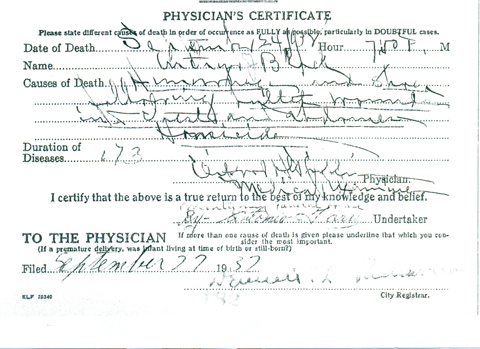On September 28, 1932, thousands of mourners crowded the streets of Providence to say goodbye to Arthur "Daddy" Black, the legendary Number King of Rhode Island. In the days leading up to the procession, more than 20,000 had paid emotional final respects to the fallen gangster inside Montgomery Funeral Home. It was an extraordinary sight for its era — thousands of white men and women crying over the casket of a dead black man — but Daddy Black had led an extraordinary life.As the procession traveled down Broadway and Courtland Street, the crowd swelled around Hoyle Square. For a decade, Black looked out for the neighborhood when City Hall would not. His number pool provided the employment, capital, and social services that consistently bypassed Providence's black community. Today, residents would repay Black's loyalty with a show of their own.
Inside Church of the Saviour, every bit of available space was taken. The reverend described Black as "a friend to humanity and a brother to us all . . . His many acts of kindness were done without a flourish of trumpets. Many poor people will miss him during the coming winter months."
A reporter for the Boston Chronicle described the sad march of mourners that passed by Black's coffin. "Women cried and in some cases strong men broke down and wept — and some of these men were white — as they looked on Daddy's face for the last time."
Black's murder made the front pages of black newspapers across the country. In Providence, his funeral procession marked the end of the numbers game as a black-owned business and source of racial pride.
Caught just a few hours after the shooting, Black's killers claimed it was a robbery that went bad when a New York gunman "got jumpy" and accidentally fired. Officials and media accepted that version but around Hoyle Square, black residents believed differently: Daddy Black may have been killed by a black gunman, but he was targeted because he had resisted the demands of white men.

CAUSE OF DEATH Homicide. But who was behind the murder? |
FROM TUFFY TO DADDY
Arthur Black was born in Charleston, South Carolina on July 24, 1880. He arrived in Providence a short time later with his mother. "He was a regular boy and earned the nickname Tuffy from his companions," a newspaper article noted.
Eventually he enlisted in the United States Navy where he served for 20 years. He saw active service in Cuba in the Spanish-American War, in China during the Boxer Rebellion, and was cited twice for bravery in World War I. He also worked as a machinist on the Panama Canal. "It is said only his color prevented him from rising to a higher rank," according to the Boston Chronicle, New England's leading black publication.
After mistakenly being credited with 30 years of service instead of 20, he returned to Providence and started his number pool. In 1923, the game was black America's glamor business — a testament to black innovation and entrepreneurship during a time of pervasive racism. With unemployment rates more than double for blacks what they were for whites, the numbers provided jobs for average, upstanding citizens.